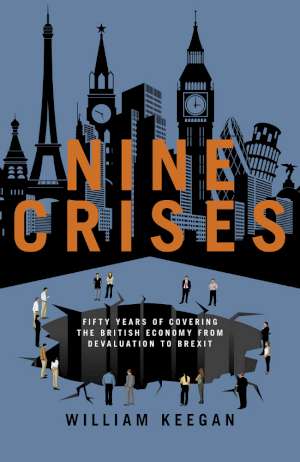02 December 2019
Nine Crises:
50 years of covering the British economy - from devaluation to Brexit
William Keegan
2019, Biteback Publishing, 304 pages,
ISBN 9781785903045
Reviewer: Dr Rebecca Harding, CEO, Coriolis Technologies

This book is a personal memoir from one of the country’s most esteemed economic journalists. It covers British economic history in the post-war era from the 1950s right up to the Brexit crisis. But do o not read it as a detailed piece of economic analysis. If you do, you will be disappointed. Instead, enjoy it for what it is – a deeply personal narrative of events from the perspective of two key things: the failings of decision-making by successive UK policy makers and the inextricable link between UK economic decision-making and its politics.
Nine Crises is not a textbook. It is almost an economic stream of consciousness covering nine “events” or “shocks” that have altered the trajectory for the UK economy. The first 46 or so pages are about his own history – why he chose to study economics and the tools it provides for analysing the rhetoric and the politics of the time. There is no attempt to analyse each crisis – to some extent that is not its purpose. Instead, it is a reflection by Keegan of his personal journey from starting as a young FT journalist to his enduring position at the Observer ending as its Economics Editor and, subsequently, Senior Economic Commentator. The book is a Who’s Who of the journalists, the policy makers and the politicians of the last 50 years, as well as, in places, a useful reference guide to some of London’s restaurants and cafés!
What is fascinating, therefore, is not the economics in the book. It is the way in which Keegan himself engages with the debates throughout the period. His views are well-known to be staunchly Keynesian – hardly a surprise since he studied economics at Cambridge in the late 1950s. This means that he covers the first few crises, from devaluation in 1967, through the oil crisis in 1973, and the IMF crisis in 1976 almost descriptively focusing on the under-current of politically misguided decision-making rather than a failure of policy.
From 1979 onwards, he is markedly less sympathetic to the economic theory behind his narrative invoking his own phrase “sadomonetarism” to describe the Thatcher/Lawson attempts to implement monetarism. He argues the view is independent of politics, but it is strongly informed by the school of economic thinking from which he comes.
Equally compelling is how he brings the reader into the debate. While he does not attempt to link the crises together himself, it is impossible to read it dispassionately – whatever your views. He makes it clear throughout that while he may have disagreed with the politics of the Thatcher era, he nevertheless retained a deep respect for, indeed friendship with, some of the key protagonists. He comments that economists tend to fight, in the words of his inspiration, JK Galbraith, “because the stakes are so low,” but treats all views as valid leaving you, the reader, to join the dots and draw your own conclusions.
For me, then, this was a particularly engaging read. Several themes across the various crises kept re-emerging: an obsession with growth, the balance of payments and the weakening of the UK’s trade position with the rest of the world, persistently high government borrowing and inflationary pressures inherent to the UK economy but exacerbated in the 1970s with incomes policies which caused major industrial action and then the failure of monetary policy to address these until the UK’s ignominious exit from the European Exchange Rate Mechanism. Above all, the failure of the UK to adjust to the reality of the post-war, post Empire era in its approach to economics has dominated both its approach to all of these crises and, more importantly, its approach to its relationship with Europe. What is clear throughout is that the politicisation of economic policy has created an almost haphazard approach to policy solutions, with the result that we are now leaving the EU with no real sense of what we will achieve economically as a result.
Whether you have been an economist for some or all of this period, or whether you are new to the subject, this is a book that is an important documentary of the post-war era from a leading economics journalist. It includes interviews with the Chancellor of the Exchequers through the time it covers as well. But the final crises are the contemporary ones: the failings of regulation in the run -up to the financial crisis and then the strictures of austerity imposed by the Cameron government as a mechanism for reducing the role of the state. Keegan’s sees the decision to leave the EU as a culmination of these nine crises and it is with immense sadness that he ends the book with a plea to avoid a cliff-edge Brexit. Whatever your attitude towards Keynesian or Monetary economics, that is a point with which it is hard to disagree.
